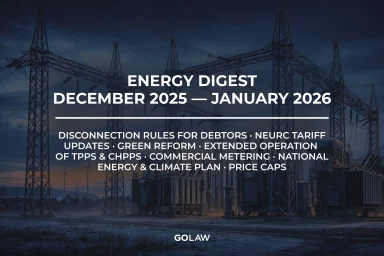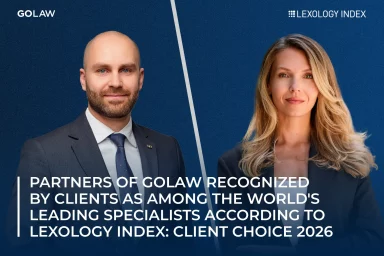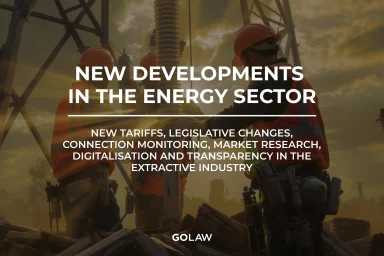Climate Change Litigation: global trends and future outlook
Taking into account the global climate change crisis, its devastating consequences resulting in rising temperatures, environmental degradation, natural disasters, weather extremes, business and economic disruption, as well as the audience’s interest in studying this issue, GOLAW invited the leading climate expert Prof. Dr. Michael Rodi – Scientific and Managing Director at the Institute for Climate Protection, Energy and Mobility (IKEM), to talk about climate change litigation, its prospects, and challenges.
Climate law is a new but meanwhile well-established branch of law defined by the goals of climate protection and adaptation and based on its own legal principles. It was not surprising that in recent years we saw an enormous rise worldwide of corresponding lawsuits – climate litigation. States are sued for not achieving their climate targets, major carbon emitters are targeted by tort law claims, yet companies also sue each other challenging their published climate performance and related effects on competition.
Litigation, and therefore adjudication, is becoming an increasingly important instrument of climate protection. Particularly when applied as strategic litigation, it can enhance the implementation and enforcement of adequate climate protection and adaptation measures by states and individuals.
Yet when relying on litigation as a tool, the effects and scope of the instrument itself are limited. Firstly, litigating climate change usually results in a divergent decision by a state authority, dividing the parties into winners and losers instead of co-participants in the necessary transformation towards climate neutrality.
Secondly, litigation, in the sense of adjudication within the given state judicial setting, is already complemented in our fields of law, including environmental law, by the mechanism of alternative dispute resolution, such as mediation and arbitration in particular.
Indeed, for the latter one must highlight the existing Optional Rules for Arbitration of Disputes Relating to the Environment and/or Natural Resources, the so-called Environmental Rules by the Permanent Court of Arbitration, as well as the latest study by the ICC regarding the very potential of arbitration to solve climate-related disputes.
The task force set up by the ICC has examined the potential of arbitration for disputes related to climate change and identified necessary adjustments to the rules of procedure. The Environmental Rules are expressly designed to take into account the special features of disputes relating to natural resources and the conservation and protection of the environment. The optional rules are open to states and international organizations, but also to private parties.
The rules include a list of knowledgeable arbitrators and experts. In addition, provisions are included on the requirements of confidentiality as well as on multiparty procedure. Even though the very term “climate-related dispute” and its scope is part of an ongoing discussion, as the study by the ICC task force shows, one can already identify arbitration cases under the current rules of procedure that directly or indirectly include legal and/or factual matters pertaining to global climate change.
This becomes very obvious when looking at cases under the Energy Charter Treaty, e.g. investment protection either regarding fossil fuel investment or investment in renewable energy facilities. Up to now, these cases are addressed by the parties and the law as mere investment arbitration cases though they obviously have a huge impact on climate change and climate protection respectively. Yet, arbitration and climate-related disputes are not only a matter of investment, free trade, or comparable legal issues. One doesn’t need a significant amount of “creativity” to identify potential future cases for arbitration and adjudication.
Given the significant, measurable, and predictable increase in laws and regulations addressing global climate change, and given the existing and presumably increasing competitive behaviour and market for climate protection measures, climate neutrality labels, and comparable acts of corporate social responsibility, a growth of conflicts and disputes that demand expertise and adequate procedural rules for resolution is more than just a probability. Convinced that climate change disputes will increase and shape legal work in this century and recognizing that these disputes will need specific expertise in climate law as well as adapted procedural rules, IKEM (Institute for Climate Protection, Energy and Mobility) has begun research in the field of alternative dispute resolution in climate-related disputes.
In acknowledging the existence of arbitration and other forms of alternative dispute resolution in climate-related disputes, IKEM figured that there is a need to develop adequate rules of procedure, expertise, and (ultimately) potentially institutional capacity to address such disputes as they are climate-related.
Sharing its very first ideas for the potential of arbitration, mediation, and other forms of alternative dispute resolution for climate-related disputes, IKEM received astonishing feedback from arbitrators, lawyers, mediators, and stakeholders. Based on our research and the expertise of our partners, IKEM will hold and chair an official Side Event at COP27, presenting and debating the role of arbitration, mediation, and its potential institutionalization for climate-related disputes. We believe that this and other forms of alternative dispute resolution can at least complement existing climate litigation and can have a significant impact on climate protection.
Sign up to be aware
New achievements are inspired by information. GO further, don’t miss out GOLAW news and legal alerts
Our expertise
-
- Energy and Natural Resources
- Antitrust and Competition
- Banking and Finance
- Compliance, Corporate Governance and Risk Management
- Corporate and M&A
- Criminal and White Collar Defence
- Defense in Anti-corruption procedures and regulations
- Private: Digital Economy Practice
- Labor and Employment
- Natural Resources and Environment
- Government Relations (GR)
- Insolvency and Corporate Recovery
- Intellectual property
- International trade
- Legal support of business and private Сlients in Germany
- Litigation and dispute resolution
- Private clients
- Real Estate and Construction
- Restructuring, Claims and Recoveries
- Martial Law
- Tax and Customs
-
- Agribusiness
- Aviation
- Chemical industry
- Engineering, Construction and Building Materials
- Environment and Natural Resources
- Financial institutions
- IT and AI
- Industry and manufacturing
- Healthcare industries, Life sciences and Pharmaceuticals
- Media, Entertainment, Sports and Gambling
- Retail, FMCG and E-Commerce
- Transport and Logistics
We use cookies to improve performance of our website and your user experience.
Cookies policy
Cookies settings







